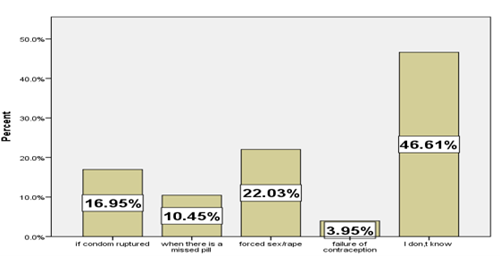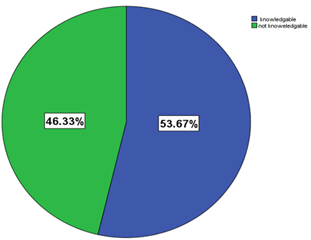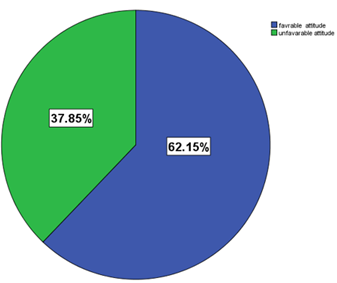Research Article
Knowledge and Attitude about Emergency Contraception among Female Students of Addis Ababa Medical and Business College-A Cross-Sectional Study
1 Department of neonatal nursing Kotebe Metropolitan University, Addis Ababa, Ethiopia.
2 Federal Ministry of Health Addis Ababa, Ethiopia.
3 Korean hospitals Addis Ababa, Ethiopia.
*Corresponding Author: Zerihun Adraro Adasho, Department of neonatal nursing Kotebe Metropolitan University, Addis Ababa, Ethiopia.
Citation: Zerihun A Adasho, A Mekonen, K Womdimu, S Yetena. (2023). Knowledge and Attitude about Emergency Contraception among Female Students of Addis Ababa Medical and Business College-A Cross-Sectional Study. Clinical Obstetrics and Gynaecology Research. 1(1); DOI: 10.59657/2992-9725.brs.22.001
Copyright: © 2023 Zerihun Adraro Adasho, this is an open-access article distributed under the terms of the Creative Commons Attribution License, which permits unrestricted use, distribution, and reproduction in any medium, provided the original author and source are credited.
Received: September 09, 2022 | Accepted: September 30, 2022 | Published: October 05, 2022
Abstract
Background: A study in Ethiopia has assessed the knowledge and attitudes about emergency contraception among female students at Addis Ababa Medical and Business College. Emergency contraception is a method of contraception used after unsafe/unprotected sexual intercourse (sexual abuse, misuse of regular contraception, or non-use of contraception).
Methods: An institution based cross-sectional descriptive study was conducted among female students of Addis Ababa Medical and Business College from April-August 2018. A total of 354 students were included in the study by using a simple random sampling technique. The data was collected using pre-tested, semi-structured, self-administered questionnaires. Data was entered into EPI info 3.5.3 and analyzed using SPSS version 20, and the results were presented in graphs, tables, and charts.
Results and recommendation: In this study, 53.6% of students had good knowledge of emergency contraception, 46.6% did not know the situation to take emergency contraception, and the majority did not know the drugs used for emergency contraception, or the time to start emergency contraception after unprotected sexual intercourse. Sixty-two-point one percent of respondents have a positive attitude towards emergency contraception. Therefore, information communication education should be created for college students about unwanted pregnancy, how to access emergency contraception, when to use it, and behavior change education should be given by mini-media and school clubs to change their attitudes. Researchers should conduct further studies about emergency contraception in multiple study areas and other study designs.
Keywords: knowledge; attitude; emergency contraception; addis ababa medical and business college
Introduction
Background
Emergency contraception is a last chance to prevent pregnancy after unprotected sexual intercourse. It can be used after unsafe/unprotected sexual intercourse (sexual abuse, misuse of regular contraception or non-use of contraception) or before the potential time of implantation [1,13]. Since it is difficult to determine the infertile time of the cycle with certainty, emergency contraception should be provided for any woman who is concerned about her risk of pregnancy regardless of the cycle day of exposure [8]. There are two types of emergency contraception: hormonal methods (pills) and intrauterine contraceptive devices (IUCD). A hormonal emergency contraceptive pill consists of combined oral contraceptive pills and progesterone only pills where the first dose is taken as soon as possible, but no later than three days after unprotected sexual intercourse, followed by another dose 12 hours later. The IUCD is taken within five days of unprotected sexual intercourse [9].
If properly and timely used, all types of emergency contraceptive pills (ECP) can decrease the risk of unintended pregnancy by more than 75%, which in turn helps to reduce unsafe abortion [6]. Globally, 210 million pregnancies occur each year. Around eighty millions of these are unintended, and 10% of these pregnancies lead to unsafe abortions. Worldwide, about 529,000 girls and women die from pregnancy related causes each year. Of these, 13% are due to unsafe abortion. It is estimated that two in five unsafe abortions occur among women under age 25 and about one in seven women who have unsafe abortions are under the age of 20 years [10].
Among the 6.4 million induced abortions occurring annually in Africa, only 3% are done safely and the rest 97% are unsafe abortions. Among all induced abortions occurring in Africa, 39% are contributed by Eastern African regions (EDHS 2011). Most students join higher institutions (colleges and universities) during their sexually active age and engage in sporadic, unprotected pre-marital sex, which leads to unintended pregnancy that could be prevented by using emergency contraception [11].
Unintended pregnancies pose significant public health problems, associated with a higher rate of abortion and abortion related complications [7]. Among female students of tertiary institutions in Kaduna, Nigeria, 14.6% had ever heard about ECP, among these, 54.2% heard from friends/peers and 41.7% heard from health personnel. Majority 75
Materials and Methods
Study area
The study was conducted at Addis Ababa Medical and Business College. The college is in Addis Ababa, Ethiopia and was established in 2005. The college is currently giving training in business and medical fields to a total of 3220 students: 1216 male and 2004 female.
Study design and period
An institution-based cross-sectional descriptive study was conducted in April–August 2018.
Sample size determination
The sample size was calculated using a single population proportion formula based on the assumption that 50% of students were knowledgeable and had a positive attitude towards emergency contraception, with a 95% confidence level and a 0.05 margin of error between sample and population parameters. A total of 354 students were included in the study after considering the finite population correction formula and 10% non-response rate.
Sampling techniques
Stratified random sampling was used. The students were divided into two strata: medical students and non-medical students. Then the sample was proportionally distributed to each stratum based on the number of students, and finally, the study units were selected using a simple random sampling technique.
Study population
The source population was all female students at Addis Ababa Medical and Business College. Randomly selected regular female students of Addis Ababa Medical and Business College available during the data collection period were included in the study.
Variables
Dependent variables: Knowledge of emergency contraception, attitude towards emergency contraception use.
Independent variables: sociodemographic characteristics: age, religion, marital status, being sexually active, year of study.
Operational definition
Students who scored the median and above for knowledge-related questions were considered knowledgeable and students who scored below the median were considered not knowledgeable.
Students who scored the median and above for attitude related questions were considered to have a favorable attitude and students who scored below the median for attitude related questions were considered to have an unfavorable attitude.
Data collection tools and procedures
Data was collected using structured self-administered questionnaires developed by reviewing different literature. The questions were prepared in English and have three parts: sociodemographic questions, attitude, and knowledge related questions. The data was collected by five trained nurses after the method of collection and the purpose of the study were clearly explained to the participants. Two BSc nurses supervised the data collection. Actual data collection was conducted after minor modifications were made to the tool based on the pre-test findings.
Data quality control
To assure the quality of the data, training was given for data collectors and supervisors for two days on the clarity of tools and overall data collection procedures. On each day of data collection, the supervisor checked the collected data for its completeness and consistency at each point. The principal investigator rechecked the data during entry into the computer and again before analysis for missing values.
Methods of data analysis
The collected data was checked for completeness, consistency, coded and entered into EPI info 3.5.3 and exported to SPSS version 20 for analysis. Before analysis, missing values were checked, and new categories were created as needed. Univariate analysis such as percentages and frequencies were used. The questions about attitude variables were measured on a Likert-like scale. This scoring was then reversed for negatively worded statements. The sum of the scores was computed and dichotomized into favorable and unfavorable attitudes. Respondents who scored the median and above were considered to have a favorable attitude and those who scored below the median were considered to have an unfavorable attitude. Knowledge questions were calculated by giving value one for correct answers and value 0 for incorrect answers. The sum was computed and respondents who scored the median and above were considered knowledgeable and those who scored below the median were considered not knowledgeable.
Results
Sociodemographic characteristics
All 354 students participated in the study with a response rate of 100%. About 63.8% were aged less than 20 years, and 28% of participants were between age 20 and 25 years. Most students were orthodox, Bachelor's degree, single, second and health science students (table1).
Table 1: Percentage and frequency distribution of sociodemographic characteristics of female students at Addis Ababa Medical and Business College, 2018
| Questions | Responses | Frequency | Percentage |
| Age in years | < 20> | 226 | 63.8 |
| 20-25 | 99 | 28 | |
| 25-30 | 29 | 8.2 | |
| Religion | Orthodox | 239 | 67.5 |
| Muslim | 34 | 9.6 | |
| Protestant | 65 | 18.4 | |
| Others | 16 | 4.5 | |
| Ethnicity | Amhara | 172 | 48.6 |
| Oromo | 61 | 17.2 | |
| Tigre | 22 | 6.2 | |
| Gurage | 73 | 20.6 | |
| Others | 26 | 7.3 | |
| Educational status | Bachelor’s degree | 202 | 57.1 |
| Level | 152 | 42.9 | |
| Marital status | Single | 279 | 78.8 |
| Married | 53 | 15 | |
| Divorced | 18 | 5.1 | |
| Widowed | 4 | 1.1 | |
| Year of study | First year | 126 | 35.6 |
| Second year | 127 | 35.9 | |
| Third year | 81 | 22.9 | |
| Fourth year | 20 | 5.6 | |
| Field of study | Medical | 326 | 92.1 |
| Non-medical | 28 | 7.9 |
Knowledge about emergency contraception
Out of the total participants, 305 (86.1%) know that EC can be obtained from a pharmacy/health facility, 37.2% and 15.8% know that COC and IUCD are used as EC respectively, 41.2% know the recommended time to take ECPs after unprotected sexual intercourse (72 hours) and 30.7% know the recommended time interval between doses of ECPs (12 hours). The major source of information was 51.1% from lectures, 33.6% from radio and television, and 9.6% from classmates and friends. Forty-six percent of respondents did not know the situation to use emergency contraception. The overall summary index of knowledge showed that 53.6% were knowledgeable about emergency contraception with a mean score of 4, standard deviation two, minimum score zero and maximum score of 8 (table-2 and figure-1-2).
Table 2: Frequency and percentage distribution of knowledge of EC among female students of Addis Ababa Medical and Business College, 2018.
| Questions | Response | Frequency | Percentage |
| Where do you think EC could be obtained | Pharmacy | 305 | 86.1 |
| Any shop | 2 | 0.5 | |
| I do not know | 47 | 13.2 | |
| Which one is used as EC | COC | 132 | 37.2 |
| POP and IUCD | 56 | 15.8 | |
| Antibiotic like ampicillin | 18 | 5 | |
| I do not know | 148 | 41.8 | |
| EC prevents sexually transmitted diseases | Yes | 76 | 21.4 |
| No | 142 | 40.1 | |
| I do not know | 136 | 38.4 | |
| Recommended time to start EC after sex | Within 24 hrs. | 50 | 14.1 |
| Within 72 hours | 146 | 41.2 | |
| Within 5 days | 24 | 6.7 | |
| I do not know | 134 | 37.8 | |
| How effective is EC | >95percent effective | 104 | 29.3 |
| 75-89 percent effective | 131 | 37 | |
| < Ten> | 6 | 1.6 | |
| Not effective at all | 38 | 10.7 | |
| I do not know | 75 | 21.1 | |
| Recommended dose | One dose | 122 | 34.4 |
| Two doses | 74 | 20.9 | |
| Three doses | 17 | 4.8 | |
| I do not know | 141 | 39.8 | |
| 12 hours apart | 109 | 30.7 | |
| 24 hours apart | 64 | 18 | |
| 72 hours apart | 71 | 20 | |
| I do not know | 110 | 31 | |
| Source information about contraception | Radio and TVs | 119 | 33.6 |
| Lectures | 181 | 51.1 | |
| Classmates and friends | 34 | 9.6 | |
| Informal publication | 20 | 5.6 |
Figure 1: Knowledge of situations to take emergency contraception among female students of Addis Ababa Medical and Business College
Figure 2: Knowledge score of female students of Addis Ababa Business and Medical College
Attitude towards emergency contraception
From the respondents, 36.4% disagreed with using EC if she had unprotected sexual intercourse, 59.6% agreed with the question: If a close friend has unprotected sexual intercourse, I would advise her to use EC 33.9% agreed that EC is one way of abortion,41.2% agreed not to use it because of fear of side effects. 55.6 percent agreed with the question: If a close friend has unprotected sexual intercourse, I would advise her to use EC 33.9percent agreed that EC is one way of abortion, 41.2percent agreed not to use it because of fear of side effects. 55.6percent believe that emergency contraception may hurt the baby if it does not work and 62.1percent of respondents have a positive attitude towards emergency contraception with a median score of 13, standard deviation 2.6, maximum score 19, and a minimum score of 8 (table 3 and figure 3).
Table 3: Frequency and percentage distribution of attitude towards EC among female students of Addis Ababa Medical and Business College, 2018
| Questions | Response | Frequency | Percentage |
| If I have unprotected sexual intercourse, I will use EC | Disagree | 129 | 36.4 |
| Neutral | 119 | 33.6 | |
| Agree | 106 | 29.9 | |
| If a close friend has unprotected sexual intercourse, I will recommend that she use EC | Agree | 119 | 33.9 |
| Disagree | 211 | 59.6 | |
| Neutral | 24 | 6.7 | |
| Widespread use of EC will increase the prevalence of HIV/AIDS and STI | Agree | 122 | 34.5 |
| Neutral | 26 | 7.3 | |
| Disagree | 206 | 58.2 | |
| I have positive attitude towards EC | Agree | 93 | 26.3 |
| Neutral | 138 | 39 | |
| Disagree | 123 | 34.7 | |
| Emergency contraception is one way of abortion | Agree | 120 | 33.9 |
| Neutral | 148 | 41.8 | |
| Disagree | 86 | 24.3 | |
| I do not want to use EC for fear of side effect | Agree | 146 | 41.2 |
| Neutral | 104 | 29.4 | |
| Disagree | 104 | 29.4 | |
| EC will affect ongoing regular methods of contraception negatively | Agree | 221 | 62.4 |
| Neutral | 50 | 14.1 | |
| Disagree | 83 | 23.4 | |
| Believe emergency contraception may hurt the baby in case it does not work | Agree | 197 | 55.6 |
| Neutral | 102 | 28.8 | |
| Disagree | 55 | 15.5 |
Figure 3: index score of Attitude of female students of Addis Ababa Business and Medical College
Discussion
The investigation showed that 53.6% of participants had good knowledge of emergency contraception. It was in line with study findings from the University of Botswana [5] where 52.8% of female students had good knowledge. It was higher compared to studies in Mekele College Ethiopia by [3]. 45%, Mizan Teppi University by [15] 28.3%, Mizan high school by 34.6%, and Ambo town by [14] 20.1% all in Ethiopia. The discrepancy might be due to the period of study, as this study is more recent and some awareness might have been created on the topic, or it might be because this study was conducted in the capital city of the country, where there is more access to information and technology. Again, the inconsistency might be attributed to the fact that most participants of this study were health science students.
The vast majority (86.1%) of participants know the right place to obtain EC, 37.2% and 15.8% of respondents know the drugs used as EC (COC and IUCD) respectively, which is almost similar to Kaduna, Nigeria. 13.6% for COC [2], but lower compared to Mizan high school Ethiopia, where 34.4% know IUCD [15]. Less than half (41.2%) know the recommended time to start EC after unprotected sexual intercourse, which is in line with the University of Botswana by [5] 38.2% but higher than Mizan Teppi University Ethiopia by [15] 28.3%. The difference might be due to a difference in sample size and most of the participants were health science students, so they might have got the information from academic classes.
Thirty-point seven percent know the recommended time between doses of emergency contraceptive pills, which is slightly higher than the University of Botswana [5] 17.9%, and higher than Mizan Teppi University's 14.8% [15]. Half of the respondents accessed information about emergency contraception from lectures, 33.6% from radio and television, and 9.6% from classmates and friends, 46.6% did not know the situation to use emergency contraception.
Sixty-two-point one percent of respondents have a positive attitude towards emergency contraception, which is higher compared to Botswana University 45.5% [5], Mekele College Ethiopia 46.4% [3], Mizan Teppi University Ethiopia 53.2% [15], and Ambo town Ethiopia50.1% [14], but much higher than Kaduna Nigeria20% [2]. The inconsistency might be due to the method of analysis used for indexing attitude score. Some studies used a five-point Likert scale, but this study used a three-point Likert scale. In some studies, the mean was used for cutoff point. This study used the median score.
Among the respondents, 36.4% disagreed with using EC if she had unprotected sexual intercourse, 59.6% disagreed with the question if a close friend had unintended sexual intercourse, I would advise her to use EC, 33.9% agreed that EC is one way of abortion, 41.2% agreed not to use EC because of fear of side effects, and 55.6
Conclusion
In this study, almost half of the participants had no adequate knowledge about emergency contraception and even did not know the situations to take emergency contraception. The majority did not know the drugs used for emergency contraception, or the time to start emergency contraception after unprotected sex. More than half of students have a positive attitude, but still more is needed to be done. Therefore, information communication education should be created in colleges about unwanted pregnancy, how to access emergency contraception, when to use it, and behavior change education should be given by mini-media and school clubs to change their attitudes. Researchers should conduct further studies about emergency contraception in multiple study areas and other study designs.
Acknowledgements
Ethical approval and consent to participate
An ethical approval letter was obtained from Addis Ababa Medical and Business College. The letter was given to Addis Ababa Medical and Business College to obtain permission to interview the students and oral consent was received from the students to participate in the study.
Consent to publication
Not applicable
Acknowledgement
My heartfelt gratitude goes to the supervisors, data collectors, and respondents who participated in this study.
Conflict of interest
The authors declare that there is no conflict of interest.
Funding
No funding received for this project
Availability of data and materials
The data is all contained in the manuscript. If asked, the correspondence author will send other information.
Authors’ contribution
ZA participated in the conception, design, analysis, report writing, and manuscript writing.
AM engaged in the conception, design, analysis, and report writing
KW engaged in the conception, design, analysis, and report writing
SY engaged in the conception, design, analysis, and report writing
References
- Center for Health Statistics, National. 2008. Vital and Health Statistics.
Publisher | Google Scholor - Durosinlorun Amina, Krishna Regmi. (2014). A Quantitative Survey on the Knowledge, Attitudes and Practices on Emergency Contraceptive Pills among Adult Female Students of a Tertiary Institution in Kaduna, Nigeria. Primary Health Care. 4(1).
Publisher | Google Scholor - Gebrehiwot, Haftom, Berhane Gebrekidan, H. Berhe, and Kalayou Kidanu. (2013). Assessment of Knowledge, Attitude, and Practice towards Emergency Contraceptives among Female College Students at Mekelle Town, Tigray Region, Ethiopia: A Cross Sectional Study. International Journal Of Pharmaceutical Sciences And Research. 12(9):1027-1038.
Publisher | Google Scholor - Jima, Aman, Mesfin Tafa Segni, and Ababi Zergaw. (2016). Assessment of Knowledge, Attitude and Utilization of Emergency Contraception among Unmarried Women of Reproductive Age in Adama, Ethiopia. Health Science Journal 10(6).
Publisher | Google Scholor - Kgosiemang, Bobby, and Julia Blitz. (2018). Emergency Contraceptive Knowledge, Attitudes and Practices among Female Students at the University of Botswana: A Descriptive Survey. African Journal of Primary Health Care & Family Medicine 10(1).
Publisher | Google Scholor - Mesce D. (2005). Unsafe Abortion.
Publisher | Google Scholor - Monjok, Emmanuel. (2010). Contraceptive Practices in Nigeria: Literature Review and Recommendation for Future Policy Decisions. Open Access Journal of Contraception.
Publisher | Google Scholor - Mosher, William D., and Jo Jones. (2010). Use of Contraception in the United States: 1982-2008. Vital and Health Statistics, Series 23: Data from the National Survey of Family Growth 23(29).
Publisher | Google Scholor - Palermo, Tia, Jennifer Bleck, and Elizabeth Westley. (2014). Knowledge and Use of Emergency Contraception: A Multicountry Analysis. International Perspectives on Sexual and Reproductive Health. 40(2):79-86.
Publisher | Google Scholor - Susan A, cohen. (2012). Access to Safe Abortion in the Developing World: Saving Lives While Advancing Rights. Guttmacher Policy Review 15(4):2-6.
Publisher | Google Scholor - Tilahun, Dejene, Tsion Assefa, and Tefera Belachew. (2010). Knowledge, Attitude and Practice of Emergency Contraceptives among Adama University Female Students. Ethiopian Journal of Health Sciences. 20(3):195-202.
Publisher | Google Scholor - United nations population Fund population Council Ethiopia. (2010). Young Adult Survey: A Study in Seven Regions.
Publisher | Google Scholor - USAID, JSI, and Ver Project. (2011). Measuring Contraceptive Security Indicators in 2011.
Publisher | Google Scholor - Worku Alemitu. (2011). Knowledge, Attitude and Practice of Emergency Contraceptives among Female College Students in Arba-Minch Town, Southern Ethiopia. J. Health Dev. 25(3):176-183.
Publisher | Google Scholor - Zeleke Shiferaw, Bisrat, Bosena Tebeje Gashaw, and Fekadu Yadassa Tesso. (2016). Knowledge, Attitude and Practice of Emergency Contraceptives among Mizan-Tepi University Female Students, South West Ethiopia. J Pain Manage Med. 2(2).
Publisher | Google Scholor

















